GESE grade1trial
GRADE01 证据质量和推荐强度分级的共识
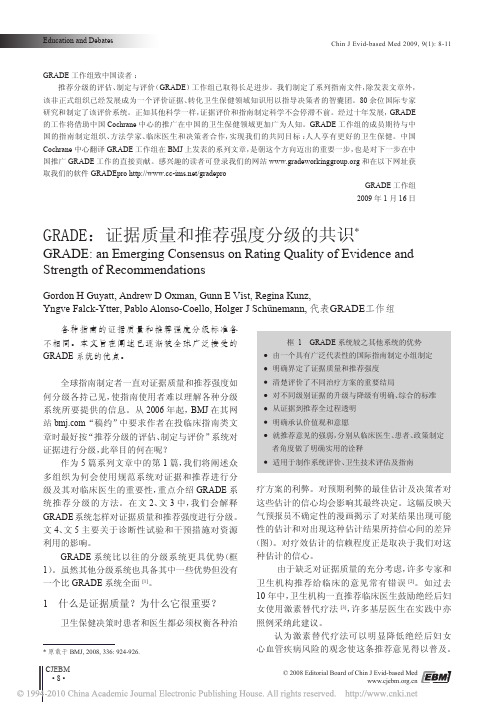
© 2008 Editorial Board of Chin J Evid-based Med
中国循证医学杂志 2009, 9(1): 8~11
教育与争鸣
3 什么是“推荐强度”?为什么它很重 要?
若当时有一个严格的证据质量分级系统,则这项降 低心血管疾病风险的证据早应被列为极低质量 [4], 推荐等级也将因此下降,因为该证据源于一些结果 矛盾的观察性研究。最终随机对照试验证明 :激素 替代疗法非但没有降低反倒可能增高心血管发病 风险 。 [5,6]
5 GRADE系统如何对证据质量分级?
为达到透明和简化的目标,GRADE 系统将证 据质量分为高、中、低、极低 4 级(框 2)。一些使用 GRADE 系统的组织甚至把低和极低归为一级。虽然 基于 RCT 得出的证据一开始被定为高质量,但我们 对该类证据的信心可能会因为下面 5 个因素而降低 :
• 研究的局限性 • 研究结果不一致 • 间接证据 • 结果不精确 • 报告有偏倚 观察性研究(如队列研究和病例对照研究)一 开始被归为低质量,但若某干预措施疗效显著(如髋 关节置换术治疗严重的髋关节炎);证据显示存在 剂量效应关系 ;存在各种可能导致疗效显著性降低 的偏倚时,观察性研究证据的等级将可能提高。
陈佩贤,陈耀龙 译 李幼平 审校
参考文献
1 Atkins D, Eccles M, Flottorp S, et al. Systems for grading the quality of evidence and the strength of recommendations I: critical appraisal of existing approaches. The GRADE Working Group. BMC Health Serv Res, 2004, 4(1): 38.
GESE1-L1+What+your+name

The First Lesson
40mins
The second Lesson
40mins
The Third Lesson
30mins
内部资料 严禁复制
Warmer
5mins
-what’s your name?
Байду номын сангаас5mins
5mins
10mins
A
B
Touch the table
Ok, I’ll do it.
5mins
Remember
What’s your name? It’s peter.
How are you?
How old are you?
I’m fine
I’m nine
Exam question and answers.
take
touch
1.Listen to the conversations
Frame A
30mins
-Hello. My name’s Mrs Smith. I’m your new teacher. What’s your name?
-It’s Maria.
-Thank you, Maria. Take your book, please .
-Hello. What’s your name?
-My
name’s John.
thanks.
-How are you today?
-Fine, -Open
your mouth, plea
-Hello.
You are…?
gese_grade4
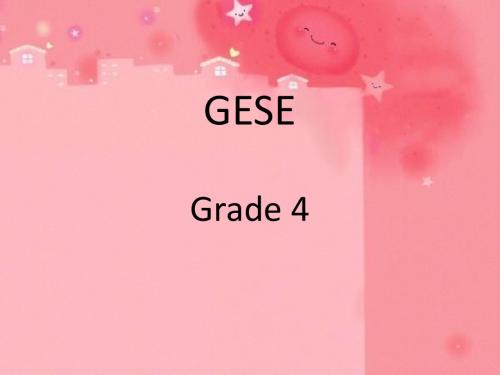
内 容
• 三一口语测试适于6-7岁以上母语为非英语的英语 学习者。 • 此项测试共分为四段12个级别。 1-3级为预备段; 4-6级为初级段; 7-9级为中级段; 10-12级为高级段。 • 高级别的考试涵盖低于该级别的其他级别的内容。 考试形式为考生与考官进行一对一的交谈。 考试成绩评定: A—优秀,B—良好,C —及格,D—不及格。
第一部分:自选话题讨论(5分钟) 考生就 个人感兴趣的或任何一个熟悉的话题,根据所 考级别的要求,自己事先进行准备。在第一部 分,所有4-6级考生都要向考官提问至少一个 与自选话题相关的问题。 第二部分:对话 (5分钟) 考官从考生所选 级别的对话题目中任选两个话题与考生进行谈 论。在对话部分中,考官虽然只选两个话题与 考生交谈,但该级别中列出的所有话题考生都 需做充分准备。
• 伦敦三一学院口语等级考试(GESE -- Graded Examinations in Spoken English)至今已有几十年的历史, 在欧亚、拉美的四、五十个国家和地 区开展。
• 英国伦敦三一学院英语口语等级考试(GESE-Graded Examinations in Speakers of Other Languages)是经英国文 化委员会提议,专门为非英语国家设计的英语口语等级考 试体系。目前已在世界四十多个国家和地区开展这项考试。 • 面向社会适应不同年龄、不同学历、不同英语水平的英语 学习者和使用者。 该项考试分四段十二级:预备级(1-3级)、初级(46级)、中级(7-9级)、高级(10-12级)。各级考试都实 行一对一面试。从5分钟(1级)简单问答到25分钟(10级 以上)的交谈,随着级别的升高,考试时间、内容和考核 项目也逐渐增加。
Grade 4
• 考试时间:10分钟 • 考试内容:两部分 1.自选话题。2对话题目。 • 总体要求:●能理解、熟悉话题中所述的 要点 ●参与对话,就个人感兴趣或与 日常生活相关的熟悉话题进行交流并陈述 个人意见、看法 ●具备一定的语言能力描述经历、 发生的事情,说明事情原因,并能就意见、 讲述过去的事情 ● 谈论未来的计划和打算 ● 表达简单的比较 ● 表达好恶 ● 表述动作发生的方式和频繁程度 词汇 ● 与自选话题相关的词汇 ● 与对话话题相关的词汇 ● 表示动作发生频繁程度的副词和词组,如: sometimes, often, never, every day, once a week • ● 表示过去时间的副词,如:yesterday, last night • • • • • • • • • •
GRADE指南_Ⅰ.导论——GRADE证据概要表和结果总结表

GRADE指南_Ⅰ.导论——GRADE证据概要表和结果总结表GRADE指南: Ⅰ.导论——GRADE证据概要表和结果总结表导论在医学研究领域中,评估和汇总证据是制定最佳医疗决策的关键步骤。
然而,由于研究方法和结果的异质性,产生了大量试验和研究结果,这使得理解和解释这些结果变得困难。
为了解决这个问题,GRADE(Grading of Recommendations Assessment, Development and Evaluation)指南应运而生。
GRADE指南的目的是提供一个系统化和透明的方法来评估证据质量并制定相应的推荐。
GRADE证据概要表和结果总结表是GRADE指南中的两个核心工具。
本文将介绍这两个工具的基本概念、使用方法以及其在医学研究中的应用。
GRADE证据概要表GRADE证据概要表是用于提供关于特定研究问题的证据证据概要的一种工具。
该表使用透明度和结构化的方式汇总可靠证据的相关信息,以帮助决策者理解证据的质量和可信度。
证据概要表的主要组成部分包括:患者人群、干预或曝露、对照组、临床结果、证据质量评估、不确定性评估和结果总结等。
证据概要表的目的是使决策者能够从整体上评估证据的质量,并对此做出正确的决策。
在填写证据概要表时,需要严格遵循预先定义的指南和准则,以确保评估的准确性和一致性。
这样可以帮助决策者更好地理解证据背后的科学依据,从而作出具有信心的决定。
结果总结表结果总结表是GRADE指南中另一个重要的工具,用于提供关于特定干预或曝露的结果的总体描述。
结果总结表的主要目标是对可靠证据产生的结果做出概括,并提供与干预或曝露相关的关键信息,如效果大小、不确定性、可接受性等。
结果总结表的结构简单明了,通常包括人群、干预或曝露、对照组、结果、效果、证据质量评估和不确定性评估等方面的信息。
通过填写结果总结表,决策者可以迅速了解干预或曝露的效果,以及相关证据的质量和可靠性。
这有助于更好地评估干预或曝露的益处和风险,从而制定出更合理和科学的医疗决策。
圣三一国际英语口语等级考试7-9级官方辅导材料GESE Grades 7-9 - Lesson Plan 1 - Choosing topics (Final)

After 2 minutes, put the students in groups of 3 to compare questions and discuss grammatical accuracy. Give them another 2 minutes to discuss their questions. Then invite the class to ask you questions about the pictures for 4 minutes.
Procedure:
1. Thinking of ideas for a Tonking of questions for the teacher’s favourite things (10 minutes)
Show on screen or hold up some large pictures of an object that’s important to you/a person that you respect or dislike/a place that’s important to you/an important social activity in your life/an ambition/a social problem. (Please note, these are only suggestions for generating ideas. You can choose alternative themes or objects if you think they are more productive and stimulating for your class.)
GRADE01 证据质量和推荐强度分级的共识

Education and Debates
Chin J Evid-based Med 2009, 9(1): 8-11
GRADE 工作组致中国读者 : 推荐分级的评估、制定与评价(GRADE)工作组已取得长足进步。我们制定了系列指南文件,除发表文章外,
该非正式组织已经发展成为一个评价证据、转化卫生保健领域知识用以指导决策者的智囊团。80 余位国际专家 研究和制定了该评价系统。正如其他科学一样,证据评价和指南制定科学不会停滞不前。经过十年发展,GRADE 的工作将借助中国 Cochrane 中心的推广在中国的卫生保健领域更加广为人知。GRADE 工作组的成员期待与中 国的指南制定组织、方法学家、临床医生和决策者合作,实现我们的共同目标 :人人享有更好的卫生保健。中国 Cochrane 中心翻译 GRADE 工作组在 BMJ 上发表的系列文章,是朝这个方向迈出的重要一步,也是对下一步在中 国推广 GRADE 工作的直接贡献。感兴趣的读者可登录我们的网站 和在以下网址获 取我们的软件 GRADEpro /gradepro
© 2008 中国循证医学杂志编辑部
CJEBM •9•
Education and Debates
Chin J Evid-based Med 2009, 9(1): 8-11
床经验的总结报告、案例报道和其他非对照临床观 察性研究都应该明确列为极低质量证据。
gese考试项目

gese考试项目GESE考试项目,全称为“英国伦敦三一学院英语口语等级考试”(Graded Examinations in Speakers of Other Languages),是一项专为非英语母语者设计的英语口语能力评估体系。
该考试体系由英国文化委员会提议,并在全球范围内得到广泛认可和推广。
GESE考试主要分为四个阶段,共12个级别。
这四个阶段分别是预备段、初级段、中级段和高级段,每个阶段包含三个级别。
考试的难度和内容会随着级别的升高而逐渐增加。
1. 预备段(1-3级):这一阶段主要针对英语初学者,考试内容相对简单,注重基础英语口语表达能力的培养。
2. 初级段(4-6级):这一阶段适合已经具备一定英语基础的学习者,考试内容包括日常交流话题,如家庭、学校生活、兴趣爱好等。
3. 中级段(7-9级):这一阶段要求考生具备较为流畅的英语口语表达能力,能够就一些复杂的话题进行讨论。
4. 高级段(10-12级):这是GESE考试中的最高阶段,要求考生能够熟练运用英语进行各种高级口语活动,如辩论、演讲等。
考试形式方面,GESE考试采用一对一的面试形式,考官与考生进行面对面的交流。
这种形式能够更加真实地反映考生的英语口语水平,而非单纯的语法知识或词汇量。
GESE考试的优势在于其灵活性和实用性。
考试内容贴近学生的实际生活经验,考试时间相对灵活,每个月都有考试机会。
此外,GESE 考试证书的获得也较为迅速,对于希望快速获得英语能力证明的学生和家长来说,是一个很好的选择。
总之,GESE考试是一项系统、全面的英语口语能力评估体系,适合不同年龄、不同英语水平的学习者参加,能够有效提升和证明他们的英语口语能力。
圣三一口语考试7-9级官方辅导材料GESE Grades 7-9 - Lesson Plan 4 - Preparing the Conversation (Final)
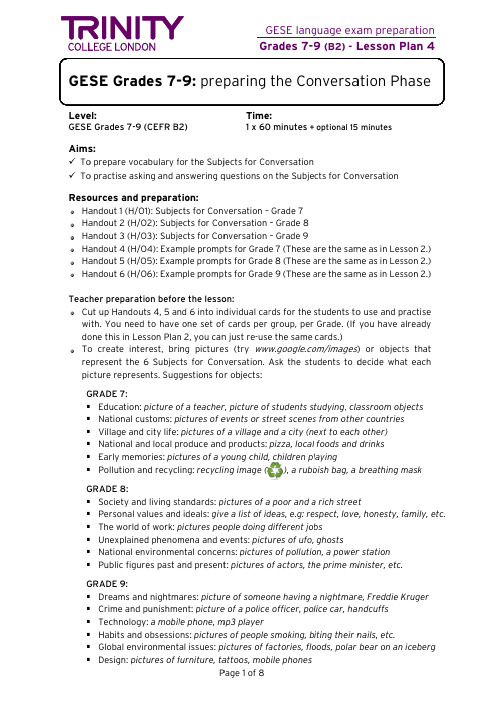
GESE Gra ades 7-9: preparing the Conversa ation Ph hase
Leve el:
GESE E Grades 7-9 (CEFR B2)
Time e:
1 x 60 0 minutes + optional 15 mi prepare vo ocabulary for the Subj jects for Co onversation To o practise asking and answering a q questions on the Subjects for Con nversation
Grades 7-9 (B2) - Lesson plan 4: preparing the Conversation Phase
Procedure:
1. Students remember questions/prompts (10 minutes) Put all of the students together according to their Grade 7, 8 or 9. Then put all of the students into small groups of 2 (or 3, if necessary), with students from the same Grade working together. Ask the students to try and remember as many questions as possible that they can ask for their Grade. (The students should try to remember questions from Lesson Plan 1 or 2 which they have already done.) Tell the students they have 6-7 minutes 2. Stimulate interest: show objects that represent the Subjects for Conversation (10 minutes) Show each Grade of students the objects that you brought for their Grade. Tell them they have 5 minutes to decide what the objects represent. After 5 minutes, give the H/O1 to the Grade 7 students, H/O2 to the Grade 8 students and H/O3 to the Grade 9 students. 3. Question preparation (20 minutes) Give the students the example prompt cards for their Grade (H/0s 4, 5 and 6). Tell the students they now have to use the prompt cards to create at least 2-3 questions for each Subject for Conversation. The students should write their questions on their handouts. The students can use the question cards to help them. They can use the question that they thought of at the beginning of the lesson. The students can also think of new questions if they want to. Tell the students they have 15 minutes to think of all of their questions. 4. Students interview each other (20 minutes) The students have now made their questions. Tell them to sit with a new person from the same Grade (e.g. Grade 7 students change partners with other Grade 7 students and Grade 8 students change partners with other Grade 8 students, etc.) There should be 2 students of the same Grade in each group. If the numbers of people are not perfect, then you can allow 3 students in one group. Tell the students that one of them is the ‘examiner’ and one of them is the ‘candidate’. (If necessary, you can have 2 examiners in one group of 3 people.) Give them 1 minute to decide who is who. They are now going to talk about themselves. Tell the students that the ‘examiner’ has 5 minutes to interview the ‘candidate’, using their own prompts. After 5 minutes, tell the ‘examiners’ and ‘candidates’ to change roles: the ‘examiner’ becomes the ‘candidate’ and the ‘candidate’ becomes the ‘examiner’. Stop the activity after another 5 minutes and ask the class for feedback/any questions. 5. Optional: reflection (15 minutes) In groups, students select and write down the 10 most useful questions/phrases of the lesson.
伦敦三一学院口语等级考试(GESE)级别描述

伦敦三一学院口语等级考试(GESE)级别描述伦敦三一学院口语等级考试(GESE -- Graded Examinations in Spoken English)至今已有几十年的历史, 在欧亚、拉美的四、五十个国家和地区开展。
此项测试适于6-7岁以上母语为非英语的英语学习者。
此项测试共分为四段12个级别。
1-3级为预备段;4-6级为初级段;7-9级为中级段;10-12级为高级段。
高一级别的考试内容均涵盖低于该级别的其它级别内容。
考试形式为考生与考官进行一对一的交谈。
考试成绩评定:A—优秀,B—良好,C—及格,D—不及格。
※※※※※※※※※※※※※※※※※※※※※※※※※※※※※※预备段(1-3级)考试时间:1级-5分钟, 2级-6分钟, 3级-7分钟。
总体要求:●考生在考官帮助下,能听懂考官简明、慢速、直接的指令和要求,并做出相应的手势或动作。
●就个人熟悉的日常生活与考官进行简单交谈。
●使用基本句型以及简单的短语、词组以及惯用语句描述自己或他人的行为、物品和场景。
●能够根据个人信息和日常生活进行简单的提问和回答。
要点提示:●预备段考试主要以问与答的形式进行。
考官的主要任务是调动考生以有限的语言能力参与到真实有趣的交流中去。
●考官可能使用与考试级别相关的考具,如图片、实物等。
考生应熟悉日常生活中所使用物品的名称。
●考生若没有听清考官的问题或指令,可以用“Can you repeat that,please?”,“Sorry?”或“Pardon?”等语句或词语,请求考官重复或解释。
但是多次使用此类语句会影响最终成绩。
● 1级考生可以使用一、两个单词作简短回答,并能用手势或动作完成考官所给的指令。
● 2级考生应能使用简单的完整句子对人和物进行描述,如“My brother’s tall. He’s got black hair.”。
在考试过程中能够向考官提出至少一个问题。
● 3级考生应能在使用完整句子的基础上,使用简单的连词,如“My brother’s tall and he’s got black hair.”。
GESE试题

Sample questions Grade 4A.假日Holidays1. What do you often do on summer vacation or winter holidays?2. Do you like XXX holiday/vacation? Where are you going to go next XXX?3. Where do you usually go on summer/winter holidays?Who did you go with?4. How did you think of the trip?5. What's the difference on shopping between two places?B.商店和购物shopping and stores1. When did you go shopping?2. How often do you go shopping?3. What kind of goods did you buy?4. Where do you usually go shopping?5. What about the price of xxx?6. What do your parents(or other relative) buy7. What's the difference between Department Store and Supermarket?C.业余爱好或体育运动sports and hobbies1. What's your hobby?2. Who do you often play with?D.食物food1. Let's talk about food?2. Do you like western food/Chinese Food?3. Do you like food/fruit?4.What do you like to cook?E.周末活动和季节性活动weekends and seasonal activity1. What did you study in your school?2. What (kind of) subject do you like ?Sample questions Grade 5A.节日Festivals1) What do you often do in spring festival?2) Where did you go last XXX3) Do you like XXX festival?4) Where are you going to go next XXX?5) What's the difference on shopping between two places?(这里说明考试随时可能涉及到其他级别的话题)B. 汽车和自行车automobile and bicycle1) Do you like a car or a bike?2) How often do you go shopping?3) Tell me something about your car?(小心考官这么问),可以反问:What do you want to know about my car ?4) What's the problem with Beijing's traffic jam?C. 庆祝活动celebration1) How do you celebrate your birthday party?2) What do you want to do in the future?(用将来时回到和If条件句)3) Who are on xxx birthday party?4) When is the Children's Day?When is the teacher's Day?How do you celebrate?D. 娱乐(电影,电视,俱乐部)entertainment1) Do you like music or movies2) What kind of movies/music do you like best? Why?3) Have you ever learned from movies/music?4) When did you watch movies the last time? 电影(歌手,歌曲,乐器,旋律)5) Have you ever learned from music?6) When did you go to a live concert the latest time? last time7) Can you play any music instrument?E.个人最近发生的事情: What did you do recently?根据考生所选的级别,从以下几个方面分项打分:听力理解反应速度语音词汇语法结构交际策略思维组织等。
grade 循证医学证据分级表 英文版
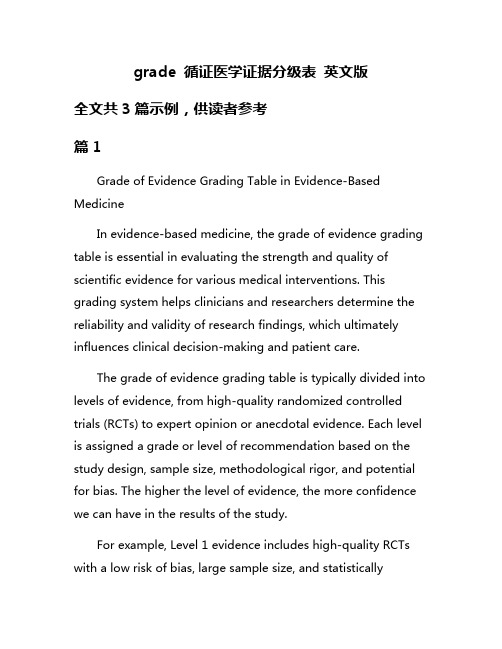
grade 循证医学证据分级表英文版全文共3篇示例,供读者参考篇1Grade of Evidence Grading Table in Evidence-Based MedicineIn evidence-based medicine, the grade of evidence grading table is essential in evaluating the strength and quality of scientific evidence for various medical interventions. This grading system helps clinicians and researchers determine the reliability and validity of research findings, which ultimately influences clinical decision-making and patient care.The grade of evidence grading table is typically divided into levels of evidence, from high-quality randomized controlled trials (RCTs) to expert opinion or anecdotal evidence. Each level is assigned a grade or level of recommendation based on the study design, sample size, methodological rigor, and potential for bias. The higher the level of evidence, the more confidence we can have in the results of the study.For example, Level 1 evidence includes high-quality RCTs with a low risk of bias, large sample size, and statisticallysignificant results. These studies provide the strongest evidence for the efficacy of a medical intervention and are considered the gold standard in evidence-based medicine. Level 2 evidence consists of well-designed cohort studies or case-control studies, while Level 3 evidence includes case series or case reports.In addition to the level of evidence, the grade of evidence grading table also considers the quality of evidence within each level. This is determined by factors such as the consistency of results across different studies, the precision of effect estimates, the generalizability of findings to other populations, and the risk of bias in the studies.The grade of evidence grading table is often used in systematic reviews and meta-analyses to summarize and synthesize the available evidence on a particular topic. By assigning a grade to each study, researchers can compare and contrast the quality of evidence across different studies and draw more reliable conclusions about the effectiveness of medical interventions.Overall, the grade of evidence grading table is a valuable tool in evidence-based medicine for evaluating the strength and quality of scientific evidence. By using this grading system, clinicians and researchers can make more informed decisionsabout the best treatment options for their patients and improve the quality of patient care.篇2Grade of Recommendation Assessment, Development, and Evaluation (GRADE) is a widely used tool in evidence-based medicine to assess the quality of evidence and strength of recommendations in healthcare. The GRADE approach provides a structured framework for evaluating the certainty of evidence and the strength of recommendations, enabling clinicians and policymakers to make informed decisions about patient care and healthcare policies.The GRADE system classifies the quality of evidence into four levels: high, moderate, low, and very low. These levels are based on the study design, risk of bias, consistency of results, directness of evidence, precision of estimates, and publication bias. High-quality evidence indicates that further research is unlikely to change the confidence in the estimate of effect, while low-quality evidence suggests that further research is likely to have a significant impact on the confidence in the estimate of effect.The strength of recommendations in the GRADE system is classified into two levels: strong and weak. A strong recommendation indicates that the desirable effects of an intervention outweigh the undesirable effects, while a weak recommendation suggests that the balance between desirable and undesirable effects is less clear. The strength of recommendations is based on the quality of evidence, balance of benefits and harms, values and preferences, and resource implications.The GRADE system is widely used in clinical practice guidelines, systematic reviews, and health technology assessments to help healthcare professionals and policymakers make informed decisions about patient care and healthcare policies. By using a transparent and systematic approach to evaluating evidence and recommendations, the GRADE system helps to improve the quality of healthcare and patient outcomes.In conclusion, the GRADE system provides a robust framework for assessing the quality of evidence and strength of recommendations in healthcare. By using a systematic approach to evaluating evidence and recommendations, the GRADE system helps to ensure that healthcare decisions are based onthe best available evidence and are in the best interests of patients.篇3Grade of Evidence of Evidence-Based MedicineIntroductionIn Evidence-Based Medicine (EBM), the grade of evidence is a system used to rate the quality of scientific evidence and the strength of recommendations based on that evidence. This system helps clinicians and researchers evaluate the validity and reliability of research findings and make informed decisions about patient care.The Grade of Evidence TableThe Grade of Evidence Table is a tool used to classify the quality of evidence in EBM studies. It categorizes evidence based on the type of research study and the overall quality of the evidence. The table is divided into four levels of evidence, with Level 1 being the highest quality and Level 4 being the lowest quality.Level 1: High-quality randomized controlled trials (RCTs) or meta-analyses of RCTs. These studies have a low risk of bias and high internal validity.Level 2: Well-designed cohort studies or case-control studies. These studies have a moderate risk of bias and moderate internal validity.Level 3: Case series or case reports. These studies have a high risk of bias and low internal validity.Level 4: Expert opinion or consensus statements. These studies have a high risk of bias and very low internal validity.Using the Grade of Evidence TableWhen evaluating the evidence in a research study, clinicians and researchers should consider the level of evidence provided in the Grade of Evidence Table. They should also consider other factors, such as the study design, the size of the study, and the consistency of the results.For example, if a study provides high-quality RCTs as evidence, it is more likely to be reliable and valid than a study that provides only case reports or expert opinions. Clinicians and researchers should use this information to make informed decisions about patient care and treatment.ConclusionThe Grade of Evidence Table is a valuable tool in EBM research and practice. It helps clinicians and researchers evaluate the quality of evidence in research studies and make informed decisions about patient care. By using this table and considering other factors, such as study design and consistency of results, clinicians and researchers can ensure that they are providing the best possible care for their patients based on the most reliable and valid evidence available.。
伦敦圣三一口语考试1级 官方文档 GESE Grade 1 - Lesson Plan 1 - Colours, body and clothing (Final)
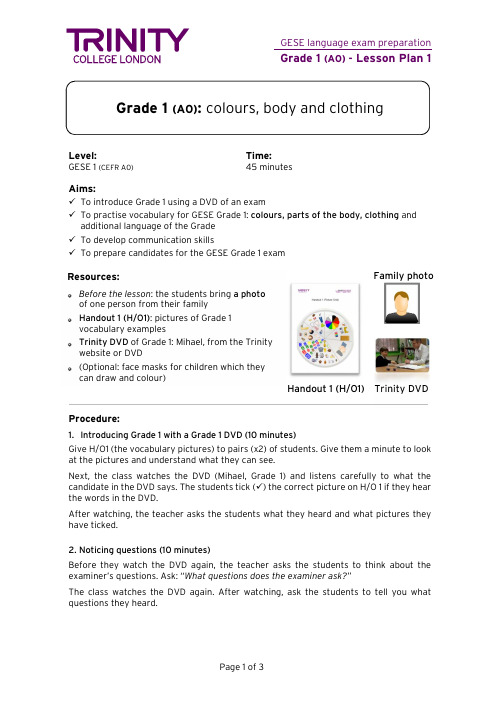
GESE language exam preparationGrade 1 (A0) - Lesson Plan 1Grade 1 (A0): colours, body and clothingLevel:Time: GESE 1 (CEFR A0) 45 minutesAims:✓ To introduce Grade 1 using a DVD of an exam✓ To practise vocabulary for GESE Grade 1: colours, parts of the body, clothing and additional language of the Grade✓ To develop communication skills✓ To prepare candidates for the GESE Grade 1 examFamily photoHandout 1 (H/O1) Trinity DVDProcedure: 1. Introducing Grade 1 with a Grade 1 DVD (10 minutes)Give H/O1 (the vocabulary pictures) to pairs (x2) of students. Give them a minute to look at the pictures and understand what they can see.Next, the class watches the DVD (Mihael, Grade 1) and listens carefully to what the candidate in the DVD says. The students tick (✓) the correct picture on H/O 1 if they hear the words in the DVD.After watching, the teacher asks the students what they heard and what pictures they have ticked.2. Noticing questions (10 minutes)Before they watch the DVD again, the teacher asks the students to think about the examiner’s questions. Ask: “What questions does the examiner ask?”The class watches the DVD again. After watching, ask the students to tell you what questions they heard.Resources:Before the lesson : the students bring a photo of one person from their family Handout 1 (H/O1): pictures of Grade 1 vocabulary examples Trinity DVD of Grade 1: Mihael, from the Trinitywebsite or DVD (Optional: face masks for children which they can draw and colour)Grade 1 (A0) - Lesson plan 1: colours, body and clothing3. Practising questions (5 minutes)Tell the students to walk around the classroom and when you say “Stop” they find a partner. For 1 minute, the students ask for and give personal information using questions from Part 2 (above).After 1 minute, the children find a new partner and repeat the activity.EXTRA OPTION 1: the students can make a paper mask (draw a face - create personal information for the mask) and repeat the activity.EXTRA OPTION 2: in pairs, the students describe each other’s masks (“His hair is black…etc.”)4. Error pairs (8 minutes)Show the class a photo of one person from your family. Use the language of Grade 1 to describe the person’s clothes, hair/eye colour. (For example: “His name is…” “His eyes are…” “His hair is…” “His sweater is...”) In pairs, the students repeat the activity with their family photos.Describe the photo of your family member again. But this time, say something that is not true about the photo. Ask the class to correct any mistakes (e.g. Teacher: “His hair is black.” Student: ”No, it isn’t, it’s blonde.”)Students repeat the activity in pairs, saying things that are true and not true. If they say something that is not true, their partner corrects them.5. Simon says (8 minutes)Start the ‘Simon says’ game by saying: “Simon says touch your nose”, ”point to a blue sweater”, ”touch a window” etc.(The students only do actions when the instruction starts with ‘Simon says’.)Next, choose a student. The student now gives the ‘Simon says’ instructions. The student uses the language of Grade 1. Select another student and repeat.6. Review (optional) (3 minutes)Tell students to look at the picture in H/O1 and ask: ”Which words did you hear today?” “Please tick (✓) the pictures that you heard.”Students tick (✓) or circle items on H/O1 that they heard in the lesson or the examiner used in the exam on the DVD.Grade 1 - Lesson plan 1: colours, body and clothing Handout 1: example Grade 1 Vocabulary。
grade临床试验证据等级标准

GRADE临床试验证据等级标准
GRADE (Grading of Recommendations, Assess, Development and Evaluation)系统是临床实践中常用的证据质量分级系统,它将证据质量分为高、中、低极低四个等级。
1.高质量证据:符合标准的随机对照试验(RCT)、大规模队列研究或多个高质量系统评价。
此类证据极少可能被后续研究推翻。
2.中等质量证据:证据略低于高质量证据,但可能支持决策。
此类证据有可能被后续研究推翻。
3.低质量证据:证据极可能被后续研究改变。
4.极低质量证据:任何疗效评估都极不确定。
以上是GRADE系统对临床试验证据等级的标准,具体应用中需要根据具体情境和需求进行理解和应用。
制表:审核:批准:。
关于国际英语口语等级考试(GES
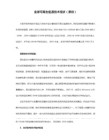
Grade 4
¥254
10
Grade 5
¥254
10
Grade 6
¥254
10
2)报名费:
GESE-China:1—6级 :20元/每人(中方考官)
联系人:长江大学外国语学院 熊楚贵
电 话:0716-8060670
地 址:湖北省教育考试院长江大学考点(荆州市南环路路1号)邮编434023
湖北省教育考试院是负责组织全省各类教育考试的专业管理机构,承办各类考试项目40余种,包括国家级考试、社会考试及海外考试。2009年5月27日,湖北省教育考试院与英国伦敦圣三一学院在武汉签订了《中外合作教育考试》合作协议,成为继北京,上海等地之后,又一引进该考试项目的地区。2010年,GESE主要在高校试考,华中师范大学,武汉大学,华中科技大学,武汉理工大学,中南民族大学,华中农业大学,湖北大学,湖北师范学院等高校的许多师生参加了考试,反响很好。长江大学于2011年获批设立考点。热烈欢迎长江大学、长江大学工程技术学院、长江大学文理学院及荆州市的各级学校学生报考。
Grade 1
约相当于小学英语水平
Grade 2
约相当于初中英语水平
Grade 3
约相当于高中英语水平
Grade 4
约相当于大学英语4级水平
Grade 5
约相当于大学英语6级水平
Grade 6
约相当于英语专业4级水平
考试费用
1)考试费:(该标准为伦敦圣三一口语等级考试2011年中国地区统一标准)
圣三一英语口语等级考试(Graded Examinations in Spoken English --GESE)是国际上为测评英语听说技能最具影响力的英语语言考试之一。该考试适合不同年龄,不同水平的考生。不论是学生,还是社会各界人士,凡是希望提升英语口语能力并得到世界权威机构认证的人士,都可自愿参加相应级别的测试,考试合格者由英方颁发国际认可的GESE等级证书,考试形式采用本介绍
grade规范ⅰ

grade 规范ⅰ论? 著方法学研究中国循证医学杂志 2011, 114: 437~445GRADE 指南: Ⅰ. 导论?? GRADE 证据概要表△和结果总结表GRADE Guidelines: 1. Introduction to GRADE Evidence Profiles△and Summary of Findings TablesGordon Guyatt,Andrew D. Oxman,Elie Akl,Regina Kunz,Gunn Vist,Jan Brozek,Susan Norris,Yngve Falck-Ytter,Paul Glasziou,Hans deBeer,Roman Jaeschke,David Rind,Joerg Meerpohl,Philipp Dahm,Holger J. Schünemann,*代表GRADE工作组摘要? 本文是GRADE(Grading of Recommendations Assessment, Development, and Evaluation ) 系列文章的导论。
该系列文章为使用 GRADE 系统提供指导, 介绍如何将该系统用于系统评价、卫生技术评估 (HTAs ) 及临床实践指南中备选方案的证据质量评价和推荐强度评级。
GRADE 方法始于提出一个明晰的问题, 包括对所有重要结果的详细说明。
证据被收集和汇总后, GRADE 提供了明确的标准来评价其质量, 包括研究设计、偏倚风险、不精确性、不一致性、间接性及效应量大小。
根据支撑证据质量及备选方案带来的预期和非预期结果间的平衡情况, 推荐强度以强 / 弱 ( 或表述为“有条件的” /“任意的” ) 作为特征。
GRADE 建议用简洁、透明、信息量丰富的结果总结表来汇总证据 ( 以显示证据质量及每一重要结果的相对效应量和绝对效应量 ) , 和 ( 或 ) 以证据概要表形式额外提供证据质量评价理由的详细信息。
GRADE分级:临床研究必经之路
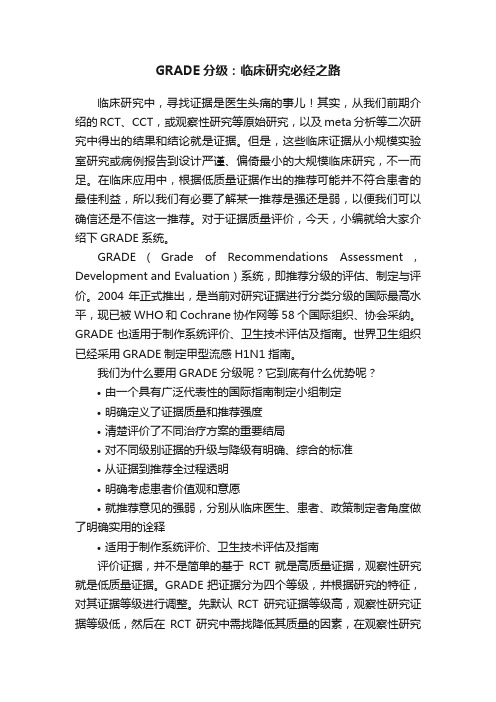
GRADE分级:临床研究必经之路临床研究中,寻找证据是医生头痛的事儿!其实,从我们前期介绍的RCT、CCT,或观察性研究等原始研究,以及meta分析等二次研究中得出的结果和结论就是证据。
但是,这些临床证据从小规模实验室研究或病例报告到设计严谨、偏倚最小的大规模临床研究,不一而足。
在临床应用中,根据低质量证据作出的推荐可能并不符合患者的最佳利益,所以我们有必要了解某一推荐是强还是弱,以便我们可以确信还是不信这一推荐。
对于证据质量评价,今天,小编就给大家介绍下GRADE系统。
GRADE(Grade of Recommendations Assessment,Development and Evaluation)系统,即推荐分级的评估、制定与评价。
2004年正式推出,是当前对研究证据进行分类分级的国际最高水平,现已被WHO 和Cochrane 协作网等58个国际组织、协会采纳。
GRADE也适用于制作系统评价、卫生技术评估及指南。
世界卫生组织已经采用GRADE制定甲型流感H1N1指南。
我们为什么要用GRADE分级呢?它到底有什么优势呢?•由一个具有广泛代表性的国际指南制定小组制定•明确定义了证据质量和推荐强度•清楚评价了不同治疗方案的重要结局•对不同级别证据的升级与降级有明确、综合的标准•从证据到推荐全过程透明•明确考虑患者价值观和意愿•就推荐意见的强弱,分别从临床医生、患者、政策制定者角度做了明确实用的诠释•适用于制作系统评价、卫生技术评估及指南评价证据,并不是简单的基于RCT就是高质量证据,观察性研究就是低质量证据。
GRADE把证据分为四个等级,并根据研究的特征,对其证据等级进行调整。
先默认RCT研究证据等级高,观察性研究证据等级低,然后在RCT研究中需找降低其质量的因素,在观察性研究中寻找增加其证据质量的因素,最后做出综合判断。
如下图:推荐强度涉及患者、临床医生、政策制定者三方面,分强推荐和弱推荐两个等级。
grade系统证据质量名词解释
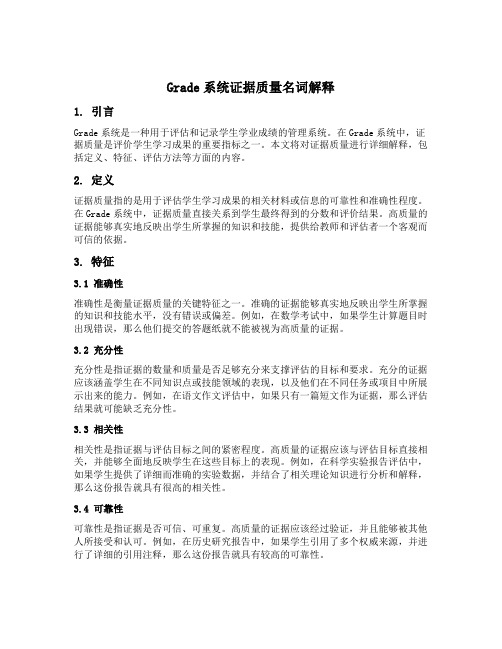
Grade系统证据质量名词解释1. 引言Grade系统是一种用于评估和记录学生学业成绩的管理系统。
在Grade系统中,证据质量是评价学生学习成果的重要指标之一。
本文将对证据质量进行详细解释,包括定义、特征、评估方法等方面的内容。
2. 定义证据质量指的是用于评估学生学习成果的相关材料或信息的可靠性和准确性程度。
在Grade系统中,证据质量直接关系到学生最终得到的分数和评价结果。
高质量的证据能够真实地反映出学生所掌握的知识和技能,提供给教师和评估者一个客观而可信的依据。
3. 特征3.1 准确性准确性是衡量证据质量的关键特征之一。
准确的证据能够真实地反映出学生所掌握的知识和技能水平,没有错误或偏差。
例如,在数学考试中,如果学生计算题目时出现错误,那么他们提交的答题纸就不能被视为高质量的证据。
3.2 充分性充分性是指证据的数量和质量是否足够充分来支撑评估的目标和要求。
充分的证据应该涵盖学生在不同知识点或技能领域的表现,以及他们在不同任务或项目中所展示出来的能力。
例如,在语文作文评估中,如果只有一篇短文作为证据,那么评估结果就可能缺乏充分性。
3.3 相关性相关性是指证据与评估目标之间的紧密程度。
高质量的证据应该与评估目标直接相关,并能够全面地反映学生在这些目标上的表现。
例如,在科学实验报告评估中,如果学生提供了详细而准确的实验数据,并结合了相关理论知识进行分析和解释,那么这份报告就具有很高的相关性。
3.4 可靠性可靠性是指证据是否可信、可重复。
高质量的证据应该经过验证,并且能够被其他人所接受和认可。
例如,在历史研究报告中,如果学生引用了多个权威来源,并进行了详细的引用注释,那么这份报告就具有较高的可靠性。
4. 评估方法为了评估证据质量,Grade系统可以采用以下方法: ### 4.1 标准化评分通过制定明确的评分标准和细则,对证据进行客观、公正的评估。
评分标准可以包括准确性、充分性、相关性和可靠性等方面的要求。
GRADE评价体系

当明确显示干预措施利大于弊或弊大于利时,指南小组将其列 为强推荐。当利弊不确定或无论质量高低的证据均显示利弊相当时, 则视为弱推荐。
是在充分权衡不同治疗方案利弊基础上的利弊平衡
如给有早产倾向的孕妇分娩前使用类固醇可降低 胎儿发生呼吸窘迫综合征的风险。其副作用小、使用 方便、又廉价,利远大于弊,应为强推荐。
GRADE offers a system for rating quality of evidence in systematic reviews and guidelines and grading strength of recommendations in guidelines. (两部分)
对患深静脉血栓的孕妇为例。使用华法林致6 ~ 12 周胎儿发育异常的风险很小。而换用肝素治疗 可避免这种风险,但会造成孕妇疼痛、不便和费用 增加等问题。根据临床经验,孕妇几乎都把预防胎 儿并发症看得最重。因此,尽管有诸多不利因素存 在,用肝素代替华法林的治疗方案作为强推荐是合 理的。
尽管一个很好的治疗方案可能因其高成本而使其 成为强推荐的可能性降低,但决定性的因素是推荐 方案的实际使用条件。由于资源配置的影响,指南 小组必须考虑推荐方案使用者的具体使用条件。
大多数指南小组使用字母和数字来表示推荐强度,但目前没有 统一的规范。这就有可能造成使用混乱。GRADE 为证据质量和推 荐强度提供了首选的符号描述法,同时也为喜欢使用数字和字母形 式机构提供了首选的数字/字母描述法。
药直接比较的随机对照试验要低。第二类间接证据
包括人群、干预措施、对照措施、预期结局及
相关研究中诸如此类的元素。
当研究纳入的患者和观察事件相对较少而致可信区 间较宽时,指南小组将降低该研究的证据质量。
GESE级别考点

新增语法项目
只需理解:
▼一般现在时的问句 ▼一般现在进行时的问句
要求理解并使用:
▼疑问词:who, when ▼限定词:some, any
▼一般现在时 ▼句型:There is/are, has got/have got, Have you got? Do you have ▼疑问词:如where、how ▼表示位置的介词:in、on、under、between、next to ▼限定词:our、their、its ▼所有格代词:mine、yours、his、hers ▼用“Yes”和“No”回答一般现在进行时的问句
第二部分:对话
※正确理解考官的提问,回答切题 ※用简单语言与考官进行讨论 ※简短直接地与考官进行适度的交流
2019/11/22
对话题目 假日、购物、学校和工作、业余爱好和体育运
动、食物、周末或季节性活动 语言功能 讲述过去的事情 谈论未来的计划和打算 表达简单的比较 表达好恶 表述动作发生的方式和频繁程度
never、every day、once a week 表示过去时间的副词,如:yesterday,last night
2019/11/22
语音: 1、避免出现背诵式的演讲语调 2、正确使用与自选话题和对话话题相关词汇的
发音和句子的语音语调 3、语流中恰当使用弱势发音 4、过去时结尾”ed“的三种不同发音,如:
2019/11/22
词汇 ○家中各个房间的名称 ○家具物品 ○家庭和朋友 ○宠物 ○本人拥有的物品 ○一星期中每日的名称,一年中每月的名称 ○ 50以内的数字 语音 ○单词发音准确 ○正确掌握简单问题的基本语音语调 ○缩略形式,如:I’ve,I’m,he’s
2019/11/22
GESE3英国圣三一口语考试3级准备资料

三级温习大全目次三级温习大全 (1)三一白话三级测验温习题大全 (1)三一白话三级测验话题汇总 (4)三一白话三级真题 Grade (4)三一白话测验三级考官问题 (5)三一白话三级备考必备:谈论气象用语小结 (9)爱好与厌恶表达用语小结 (10)白话测验中,说英语卡壳了怎么办? (11)三一白话:挑衅你的舌头英文绕口令 (12)三一白话三级测验温习题大全1. What does your father do? 你爸爸是做什么的?My father is a worker.2. What does your mother do? 你妈妈是做什么的?My mother is a nurse.3. What do your parents do? 你的怙恃是做什么的?They’re workers.4. Is your mother a teacher? 你的妈妈是先生吗?No, she isn’t.Is your father a teacher? 你的爸爸是先生吗?Yes he is.No, he isn’t.5. Where do you live? 你住在哪?I live in…6. Is your home far from here? 你家离这远吗?Yes, it is.No, it isn’t.7. Where do you study? 你在哪上学?I study at…school.8. Tell me about your school. 给我说说你的黉舍.My school is very big and beautiful. There’re three class room buildings in my school. There’re many trees and flowers in my school. We usually do sports in the playground. I love my school.9. How many buildings are there in your school? 你的黉舍就几栋楼?There are five buildings in my school.10. Is your school big? 你的黉舍大吗?Yes it is.No, it isn’t.11. Are there many trees and flowers in your school? 你的黉舍有很多树和花吗?Yes, there’re many trees and flowers in my school.No, there aren’t many trees and flowers in my school.12. When is your birthday? 你什么时刻过诞辰?My birthday is January the first.13. What’s the date today? 今天是几月几号?Today is November the twenty-fifth.14. What was the date yesterday? 昨天是几月几号?Yesterday was November the twenty-fourth.15. Is it March? 如今是三月吗?Yes, it is.No, it isn’t.16. Which month is it now? 如今是几月?Now it is November.17. Was it Friday yesterday? 昨天是礼拜五吗?No, it wasn’t. Yesterday was Saturday.18. What’s the weather like today? 今天气象怎么样?It’s sunny and warm.It’s windy and cold.19. What was the weather like yesterday? 昨天气象怎么样?It was windy yesterday.20. Is it a nice day today? 今天是一个晴气象吗?Yes, it is.No, it isn’t.21. Was it cloudy yesterday? 昨天起风吗?Yes, it was.No, it wasn’t.22. What’s the weather like in Beijing in spring? 北京春天的气象怎么样?It’s windy and cold in Beijing in spring.23. What’s the weather like in Beijing in autumn? 北京秋天的气象怎么样?It’s windy and cold in Beijing in spring.What’s the weather like in Beijing in summer? 北京炎天的气象怎么样?It’s hot in Beijing in summer.What’s the weather like in Beijing in winter? 北京冬天的气象怎么样?It’s windy and cold in Beijing in winter.24. What are your classmates doing now? 你的同窗如今正在做什么?They’re studying.25. What are you doing now? 你如今正在做什么?I’m talking with you.26. What is your teacher doing now? 你的先生如今正在做什么?He is teaching students.27. What are your parents doing now? 你的怙恃如今正在做什么?They are working.28. What time do you get up in the morning? 早上你几天起床?I get up at six o’clock in the morning.29. Where do you have breakfast, at school or at home? 你在哪吃早饭,在黉舍照样在家?I have breakfast at home.30. What subjects do you study at school? 你在黉舍学什么科目?I study math, Chinese and English at school.31. Do you have classes on Saturday and Sunday? 你周六和周日上课吗?Yes, I do.No, I don’t.32. What time do you finish school? 你几点下学?I finish school at five o’clock.33. What do you usually do in the evening? 你晚上经常做什么?I usually do my homework in the evening.34. What time is it now? 如今几点了?It’s 10 o’clock.三一白话三级测验话题汇总Family and An Person话题1.What did you study in your school?2.What (kind of) subject do you like ?3.Is your home/house far from your school? How far is it?4.Which subject do you like best?5.What are xxx doing?6.What were they doing yesterday?7.Can you do xxx?weather话题1.What's the weather like today?2.What was the weather like yesterday?Spare Time话题Do you have classes at the weekends?What do you usually do after school or class?Time and Date话题What time/(when) do you usually get up?What's the date today? What day is it today?三一白话三级真题 Grade1. 有关时光和日期的: What time(when) do you usually get up?What's the date today? What day is it today?2. 有关业余时光的: Do you have classes at the weekends?What do you usually do after school or class?3. 有关气象的: What's the weather like today?What was the weather like yesterday?4. 有关家庭生涯和小我熟习的场景a) What did you study in your school?b) What (kind of) subject do you like ?c) Is your home/house far from your school? How far is it?d) Which subject do you like best?5. What are xxx doing?6. What were they doing yesterday?7. Can you do xxx?及格请求:能用一到两句话进行完全的简略答复,反响比较敏捷,没有极端的语法错误;曩昔时.进行时和方位的描写.三一白话测验三级考官问题1.名字What’s your full name?What’s your last/family/surname?What’s your given/first name?What is your English name?How can I call you?Who give your name?What’s the meaning of your Chinese name?Have you ever changed your name? Why?2.日期月份What's the date today?What was the date yesterday?Which month is it now?When is your birthday?3.有关时光和日期的:What time(when) do you usually get up?What's the date today?What day is it today?How many days in one year?how many months in one year?how many seasons in one year?4.时光段What is your favorite time in a day? Why?What do you usually do at that time?What is your busiest time in a day?When you are free, what do you do?What do people do their spare time?Do you think spare time is important to you?Do you wear a watch?Do you think it important to be on time?How do you feel when others are late?5.有关业余时光的:Do you have classes at the weekends?What do you usually do after school or class?6.有关气象的:What's the weather like today?What was the weather like yesterday?Which district is your home in?What's the weather like today?What was the weather like yesterday?What is your favorite season? Why?What do you do in that season?What people do in this season?What do the four seasons like in your country?Tell me the climate in your hometown?What kind of weather do you like?What type of weather do Chinese people usually like?What do you often do on sunny days? And on cold days?How do you get information about weather?①hometown:the weather in my hometown is obviously different from season to season. The spring and autumn are somewhat similar as both are humid. In the summer, it is very hot and moist while when winter comes, it becomes quite cold, sometimes.②country:well, it is hard to say. It is cold in the Northern provinces like Heilongjiang, and warm in the southern ones like Hainan Island.7.有关家庭生涯和小我熟习的场景what's your favorite room in your homewhat it likes you livewhat you do in the room and explain why you like it8.黉舍生涯where are you study?Where is your school?Which school are you in?Is there a library in your building?How many floors are there in your building?Which floor is your classroom in?What did you study in your school?What (kind of) subject do you like ?Is your home/house far from your school? How far is it?Which subject do you like best?Can you tell me something about your study?What subject does you like or dislike?Tell me about your primary school?Introduce a school you like1)what's kind of it2)what size3)what u enjoy most during the school time and explainwhy you like it9.同伙Who is your best friend?Can you tell me something about your friend?How old is your friend?10.距离How do you usually go to school?Which bus do you take to go to school?How long does it take you to go to school by bike / car?Is your home far from your school?How far is it from your home to school?11.描写所做的活动What were you doing at this time yesterday?Do you play basketball?Who do you often play with?What do you do on school playground in winter?What do you often do in your spare time?What are xxx doing?What were they doing yesterday?Can you do xxx?12.将来打算/工作What’s your plan in the future?Why you want to go abroad?What kind of job will you choose? Why?13.故乡say something about your hometown.what do you think of it?what is the most interesting place in your hometown?Where do you come from ?What’s the climate like in your hometown?What are the people like in your hometown?Where do you live?Do you like a house or a flat?Do you like the place where you live?When did you begin to live there?14.teacherDescribe a teacher who is important to you.who?What does he/she teach?his/her personality?why you remember he/she?15.neighbourDescribe a person who is living near you.who is it?Which kind of person he/she is?Do you think he/she is a good neighbour?Do you have many friends?16.周末活动What do you often do on weekends?What will you do tomorrow?What did you do yesterday?What are you going to do this afternoon?What do you often play in the park?! o!17.食物What’s your favorite food ?When did you go to eat KFC/Macdon ald’s last time?18.进修和工作What’s your favorite book?Which is your first bood you read ?19.市肆购物When do you go shopping?#Who do you go shopping with?How often do you go shopping?What kind of goods fo you often buy?Are there any interest when you go shopping?What do you think is the best shop in your mind? 20.快活爱好与体育活动What’s your hobby?What’s your favorite sports ?%Who taught you ?Where did you learn it ?What’s your parents’ favorite sports?$ UHow often do you play football?Which book did you read yesterday?Do you like playing computer games?why?Talk about a kind of sport. You should say:-What it is?-Whether it is popular?-Who likes it?21.沐日Where did you go last summer holiday?What did the place look like?How did you go there ?4What’s your favorite holiday?:What do people do on this holiday?When is Christmas Eve?/What do you think of Christmas?/What’s the difference between Christmas and Spring Festival?% Gwhat do you often do in Spring Festival?三一白话三级备考必备:谈论气象用语小结[典范表达]What’s the weather like today? 今天气象怎么样?What’s the weather going to be like at the weekend?周末气象会怎么样呢?It’s fine / cloudy / rainy today. 今天气象不错/多云/有雨.It’s getting cold / warm in two days. 两天后要变冷/ 温暖.It’s rather warm / cold / hot today, isn’t it?今天很温暖/冷/热,是吗?It’s a beautiful day today. 今天气象很好.― Beautiful day, isn’t it? 气象不错,不是吗?― Yes, it is. 是的.Hopefully tomorrow will turn out fine. 愿望明天是个晴气象.[案例探讨]― It’s a beautiful day today.― ______― My goodness. It’s only May.A. And the temperature is not high.B. The weather forecast says it’s fine and going to be 26 degrees.C. It’s rather warm today, isn’t it?D. Is that true?答案与解析:答案选 B.本题考核暗示气象的外交用语.依据高低文语境,尤其是最后一句可知B项最适当.[巩固演习]1. ― I wo nder what the weather will be like tomorrow.― ______A. I don’t like the weather at this time of the year.B. I don’t mind if it is going to rain tomorrow.C. Didn’t you read the newspaper yourself?D. Let’s listen to the weather report on the r adio.2. ― ______― The high is twenty? four degrees centigrade and the low is eighteen degrees centigrade today.A. What’s the usual temperature?B. How high is the temperature?C. How is the weather today?D. How low is the temperature?Key: 1-2 D C爱好与厌恶表达用语小结爱好和厌恶(likes and dislikes)直接表达了一小我的情绪和立场.毕竟是爱好照样不爱好,要依据具体情形把你的真实情绪明确地表达出来, 并且表达厌恶时要留意委婉含蓄.I like / love the dinner you prepared yesterday (very much). 我(异常)爱好 /爱好你昨天预备的晚餐.I like / love to write poems in my spare time. 我爱好在业余时光写诗歌.I quite like the story written by the famous professor.我很爱好那位有名传授写的故事.I really enjoy reading English novels.我确切爱好看英文小说.I am fond of listening to popular music like many young people.像很多年青人一样,我爱好听风行音乐.To tell the truth, I’m rather keen on s cience fictions.说真话,我对科幻小说颇有兴致.I don’t like to play football after supper.我不爱好晚饭后踢足球.I dislike being treated like that.我不爱好被那样看待.I hate to laugh at others when they are in trouble.我憎恶在他人处于困境时嘲笑他们.[案例探讨]―__________―I’m fond of playing tab le tennis.A. Do you like sports?B. Which sport do you like best?C. Playing table tennis is fun.D. Is playing table tennis your favorite thing to do?答案与解析:B.本题考核暗示爱好的外交用语.答语是:我爱好打乒乓球.解释对方问的可能是:你最爱好什么活动?1. ―Walking an hour every day is good for one’s health.―Certainly. However, _______.A. I love doing it very muchB. I don’t hate itC. I don’t like to do it every dayD. climbing a mountain is also good2. ―_______. Did you do it yourself?―I’m glad you like it. My sister did it for me.A. I don’t think soB. I like your new hair styleC. I have no ideaD. You look nice today3. ―Which would you rather have, tea or coffee?―_______A. Neither, thank you.B. Yes, both.C. Why not?D. Sure, I would.Key: 1-3 CBA白话测验中,说英语卡壳了怎么办?无论是日常平凡,照样英语白话测验之中,时常都邑消失用词不合错误,或者说法不地道,造成误会或者不解的现象.那么我们就有须要换一种说法解释清晰,让人明确. 看下面这组对话:Mark: "English is a very easy language to learn."Susan: "What do you mean?"Mark: "Well, what I meant to say was that it's easy if you practice every day."Susan: "Oh, right."以下是几种在日常英语中能把问题解释清晰的地道说法:1. 重组语句,换一种说法."What I meant to say was...""Let me rephrase that...""Let me put this another way...""Perhaps I'm not making myself clear..."2. 从头再说一次."If we go back to the beginning...""The basic idea is...""One way of looking at it is...""Another way of looking at it is..."3. 假如一会儿卡了壳,想不起来用英语怎么说:"I can't find the word I'm looking for...""I'm not sure if this is the right word, but...""What I want to say is…"测验之中卡壳了,没紧要张,更不要七手八脚,按照我们上边所说的--换一种说法,向考官解释清晰你要说什么.如许,不单不会影响你的施展,还很可能会博得考官的赞美!三一白话:挑衅你的舌头英文绕口令1. A big black bear sat on a big black bug.2. A big black bug bit a big black bear and made the big black bear bleed blood.3. A big black bug bit a big black dog on his big black nose!4. A loyal warrior will rarely worry why we rule.5. A noise annoys an oyster, but a noisy noise annoys an oyster more!6. Ann and Andy’s anniversary is in April.7. Bake big batches of bitter brown bread.8. Big black bugs bleed blue black blood but baby black bugs bleed blue blood.9. Black background, brown background.10. Blake’s black bike’s back brake bracket block broke.11. Blue glue gun, green glue gun.12. Caution: Wide Right Turns13. Each Easter Eddie eats eighty Easter eggs.14. Elizabeth has eleven elves in her elm tree.15. Elizabeth’s birthday is on the third Thursday of this month.16. Fresh fried fish, Fish fresh fried, Fried fish fresh, Fish fried fresh.17. Freshly fried fresh flesh18. Green glass globes glow greenly.19. He threw three balls.20. He threw three free throws.21. Here’s an easy game to play. Here’s an easy thing to say:22. How many cookies could a good cook cook If a good cook could cook cookies? A goodcook could cook as much cookies as a good cook who could cook cookies.23. How may saws could a see-saw saw if a see-saw could saw saws?24. How much oil boil can a gum boil boil if a gum boil can boil oil?25. I thought a thought. But the thought I thought wasn’t the thought I thought I thought. Ifthe thought I thought I thought had been the thought I thought, I wouldn’t have thought so much.26. I wish I were what I was when I wished I were what I am.27. I wish to wish the wish you wish to wish, but if you wish the wish the witch wishes, Iwon’t wish the wish you wish to wish.28. I wish you were a fish in my dish29. If two witches would watch two watches, which witch would watch which watch?30. If you notice this notice, you will notice that this notice is not worth noticing.31. It’s not the cough that carries you off, it’s the coffin they carry you off in!32. Little red lorry33. Miss Smith’s fish-sauce shop seldom sells shellfish.34. Never trouble about trouble until trouble troubles you!35. Nothing is worth thousands of deaths.36. Picky people pick Peter Pan Peanut Butter. Peter Pan Peanut is the peanut picky peoplepick.37. Ripe white wheat reapers reap ripe white wheat right.38. She said she should sit.39. She sells sea shells on the seashore. The seashells she sells are seashells she is sure.40. Shut up the shutters and sit in the shop.41. Silly sheep weep and sleep.42. Six shining cities, six shining cities, six shining cities.43. Six sick sea-serpents swam the seven seas.44. Six sleek swans swam swiftly southwards45. Stupid superstition!46. The batter with the butter is the batter that is better!47. The great Greek grape growers grow great Greek grapes.48. The soldier’s shoulder surely hurts!49. There those thousand thinkers were thinking how did the other three thieves go through.50. There’s a sandwich on the sand which was sent by a sane witch.51. Two tiny tigers take two taxis to town.52. Very well, very well, very well ...53. What noise annoys an oyster most? A noisy noise annoys an oyster most.54. Willie’s really weary.进修办法第一步:大量背诵原汁原味的单句.对话.生涯习语.第二步:把天天背诵过的素材重复消化,借助想像力,身临其境把它们扮表演来.第三步:写日志.这个习惯看上去演习的是写作,其实它更是演习白话的妙法.当你动笔的同时,你的大脑正在剧烈地做着英体裁操.用英文进行思维是高等的白话练习办法.第四步:大量浏览报刊.杂志及各类故事.杂文,之后将它们复述出来.(超等提醒:是"复述"而非"背诵".)统一篇文章的复述工作应当重复滚动.第五步:一年阁下逐渐过渡到用英文进行日常的思维活动.每当碰到不会的词.句就记载在本子上,分散解决,并准时更新.温习.。
- 1、下载文档前请自行甄别文档内容的完整性,平台不提供额外的编辑、内容补充、找答案等附加服务。
- 2、"仅部分预览"的文档,不可在线预览部分如存在完整性等问题,可反馈申请退款(可完整预览的文档不适用该条件!)。
- 3、如文档侵犯您的权益,请联系客服反馈,我们会尽快为您处理(人工客服工作时间:9:00-18:30)。
GESE grade 1 trial ( 5 min )
1.Hi, my name is Mark, please take a seat.
2.What's your name?
3.How are you today?
4.How old are you?
5.Where do you come from?
6.What is 1 and 3?
7.What’s your favorite color/animal/number?
8.How many boys are there?
9.Show me where is 8/9/7.
10.Please point to the window/door/roof…
11.Please look at these pictures,what’s in the picture?(chair,desk,table,books)
12.Is the T-shirt clean/dirty/old/new…?(衣服类)
13.What’s that?(文具类)How many….?
14.Look at these pictures: ( show the yellow one/his eyes/身体部位)
15.Do you have a friend?Tell me about your friend.
Alright, that's the end of the test, thank you very much, you may leave now.Bye~
GESE grade 1 trial ( 5 min )
16.Hi, my name is Mark, please take a seat.
17.What's your name?
18.How are you today?
19.How old are you?
20.Where do you come from?
21.What is 1 and 3?
22.What’s your favorite color/animal/number?
23.How many boys are there?
24.Show me where is 8/9/7.
25.Please point to the window/door/roof…
26.Please look at these pictures,what’s in the picture?(chair,desk,table,books)
27.Is the T-shirt clean/dirty/old/new…?(衣服类)
28.What’s that?(文具类)How many….?
29.Look at these pictures: ( show the yellow one/his eyes/身体部位)
30.Do you have a friend?Tell me about your friend.
Alright, that's the end of the test, thank you very much, you may leave now.Bye~。
